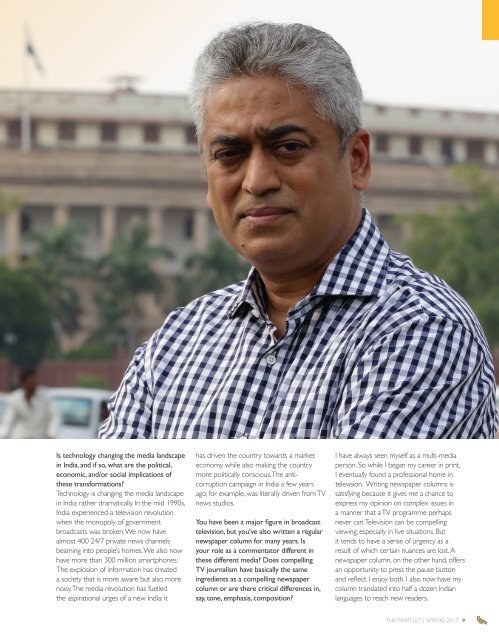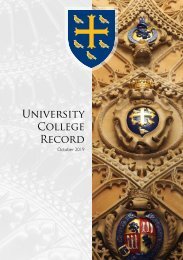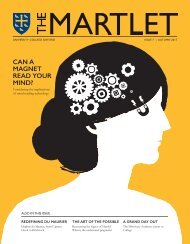Spring Martlet 2017
Spring Martlet 2017 V2
Spring Martlet 2017 V2
- No tags were found...
Create successful ePaper yourself
Turn your PDF publications into a flip-book with our unique Google optimized e-Paper software.
Is technology changing the media landscape<br />
in India, and if so, what are the political,<br />
economic, and/or social implications of<br />
these transformations?<br />
Technology is changing the media landscape<br />
in India rather dramatically. In the mid 1990s,<br />
India experienced a television revolution<br />
when the monopoly of government<br />
broadcasts was broken. We now have<br />
almost 400 24/7 private news channels<br />
beaming into people’s homes. We also now<br />
have more than 300 million smartphones.<br />
The explosion of information has created<br />
a society that is more aware but also more<br />
noisy. The media revolution has fuelled<br />
the aspirational urges of a new India: it<br />
has driven the country towards a market<br />
economy while also making the country<br />
more politically conscious. The anticorruption<br />
campaign in India a few years<br />
ago, for example, was literally driven from TV<br />
news studios.<br />
You have been a major figure in broadcast<br />
television, but you’ve also written a regular<br />
newspaper column for many years. Is<br />
your role as a commentator different in<br />
these different media? Does compelling<br />
TV journalism have basically the same<br />
ingredients as a compelling newspaper<br />
column or are there critical differences in,<br />
say, tone, emphasis, composition?<br />
I have always seen myself as a multi-media<br />
person. So while I began my career in print,<br />
I eventually found a professional home in<br />
television. Writing newspaper columns is<br />
satisfying because it gives me a chance to<br />
express my opinion on complex issues in<br />
a manner that a TV programme perhaps<br />
never can. Television can be compelling<br />
viewing, especially in live situations. But<br />
it tends to have a sense of urgency as a<br />
result of which certain nuances are lost. A<br />
newspaper column, on the other hand, offers<br />
an opportunity to press the pause button<br />
and reflect. I enjoy both. I also now have my<br />
column translated into half a dozen Indian<br />
languages to reach new readers.<br />
THE MARTLET | SPRING <strong>2017</strong> 9

















